- Home
- Salman Rushdie
The Enchantress of Florence Page 4
The Enchantress of Florence Read online
Page 4
There were things, however, which nobody thought to teach him, and which he would never learn. “We are the Emperor of India, Bhakti Ram Jain, but we can’t write our own damn name,” he shouted at his body-servant at dawn, as the old man helped him with his ablutions.
“Yes, O most blessed entity, father of many sons, husband of many wives, monarch of the world, encompasser of the earth,” said Bhakti Ram Jain, handing him a towel. This time, the hour of the king’s levee, was also the hour of imperial flattery. Bhakti Ram Jain proudly held the rank of Imperial Flatterer First Class, and was a master of the ornate, old-school style known as cumulative fawning. Only a man with an excellent memory for the baroque formulations of excessive encomia could fawn cumulatively, on account of the repetitions required and the necessary precision of the sequencing. Bhakti Ram Jain’s memory was unerring. He could fawn for hours.
The emperor saw his own face scowling back at him from his basin of warm water like an augury of doom. “We are the king of kings, Bhakti Ram Jain, but we can’t read our own laws. What do you say to that?” “Yes, O most just of judges, father of many sons, husband of many wives, monarch of the world, encompasser of the earth, ruler of all that is, bringer together of all being,” said Bhakti Ram Jain, warming to his task.
“We are the Sublime Radiance, the Star of India, and the Sun of Glory,” said the emperor, who knew a thing or two about flattery himself, “yet we were raised in that shit-hole dump of a town where men fuck women to make babies but fuck boys to make them men—raised watching out for the attacker who worked from behind as well as the warrior straight ahead.”
“Yes, O dazzling light, father of many sons, husband of many wives, monarch of the world, encompasser of the earth, ruler of all that is, bringer together of all being, Sublime Radiance, Star of India, and Sun of Glory,” said Bhakti Ram Jain, who might have been deaf but who knew how to take a hint.
“Is that how a king should be raised, Bhakti Ram Jain?” the emperor roared, tipping over the basin in his wrath. “Illiterate, ass-guarding, savage—is that what a prince should be?”
“Yes, O wiser than the Wise, father of many sons, husband of many wives, monarch of the world, encompasser of the earth, ruler of all that is, bringer together of all being, Sublime Radiance, Star of India, Sun of Glory, master of human souls, forger of thy people’s destiny,” said Bhakti Ram Jain.
“You are pretending you can’t read the words on our lips,” the emperor shouted.
“Yes, O more insightful than the Seers, father of many—”
“You are a goat who should have his throat slit so that we can eat his meat for lunch.”
“Yes, O more merciful than the gods, father—”
“Your mother fucked a pig to make you.”
“Yes, O most articulate of all who articulate, f—”
“Never mind,” said the emperor. “We feel better now. Go away. You can live.”
{ 4 }
And here again with bright silks flying
And here again with bright silks flying like banners from red palace windows was Sikri, shimmering in the heat like an opium vision. Here at last with its strutting peacocks and dancing girls was home. If the war-torn world was a harsh truth then Sikri was a beautiful lie. The emperor came home like a smoker returning to his pipe. He was the Enchanter. In this place he would conjure a new world, a world beyond religion, region, rank, and tribe. The most beautiful women in the world were here and they were all his wives. The most brilliant talents in the land were assembled here, among them the Nine Stars, the nine most brilliant of the most brilliant, and with their help there was nothing he could not accomplish. With their help his wizardry would magick all the land, and the future, and all eternity. An emperor was a bewitcher of the real, and with such accomplices his witchcraft could not fail. The songs of Tansen could break open the seals of the universe and let divinity through into the everyday world. The poems of Faizi opened windows in the heart and mind through which both light and darkness could be seen. The governance of Raja Man Singh and the financial skills of Raja Todar Mal meant the empire’s business was in the best of hands. And then there was Birbal, the best of the nine who were the best of the best. His first minister, and first friend.
The first minister and greatest wit of the age greeted him at the Hiran Minar, the tower of elephants’ teeth. The emperor’s sense of mischief was aroused. “Birbal,” Akbar said, dismounting from his horse, “will you answer us one question? We have been waiting a long time to ask it.” The first minister of legendary wit and wisdom bowed humbly. “As you wish, Jahanpanah, Shelter of the World.” “Well then,” said Akbar, “which came first, the chicken or the egg?” Birbal replied at once, “The chicken.” Akbar was taken aback. “How can you be so sure?” he wanted to know. “Huzoor,” Birbal replied, “I only promised to answer one question.”
The first minister and the emperor were standing on the ramparts of the city looking out at the wheeling crows. “Birbal,” Akbar mused, “how many crows do you imagine there are in my kingdom?” “Jahanpanah,” Birbal replied, “there are exactly nine hundred and ninety-nine thousand, nine hundred and ninety-nine.” Akbar was puzzled. “Suppose we have them counted,” he said, “and there are more than that, what then?” “That would mean,” Birbal replied, “that their friends from the neighboring kingdom have come to visit them.” “And if there are fewer?” “Then some of ours will have gone abroad to see the wider world.”
A great linguist was waiting at Akbar’s court, a visitor from a distant Western land: a Jesuit priest who could converse and dispute fluently in dozens of languages. He challenged the emperor to discover his native language. While the emperor was pondering the riddle, his first minister circled the priest and all of a sudden kicked him violently in the backside. The priest let out a series of oaths—not in Portuguese, but in Italian. “You observe, Jahanpanah,” said Birbal, “that when it’s time to unleash a few insults, a man will always choose his mother tongue.”
“If you were an atheist, Birbal,” the emperor challenged his first minister, “what would you say to the true believers of all the great religions of the world?” Birbal was a devout Brahmin from Trivikrampur, but he answered unhesitatingly, “I would say to them that in my opinion they were all atheists as well; I merely believe in one god less than each of them.” “How so?” the emperor asked. “All true believers have good reasons for disbelieving in every god except their own,” said Birbal, “and so it is they who, between them, give me all the reasons for believing in none.”
The first minister and the emperor were standing at the Khwabgah, the Place of Dreams, looking out over the still surface of the Anup Talao, the monarch’s private, formal pool, the Pool Without Peer, the best of all possible pools, of which it was said that when the kingdom was in trouble its waters would send a warning. “Birbal,” said Akbar, “as you know, our favorite queen has the misfortune not to exist. Even though we love her best of all, admire her above all the others, and value her above even the lost Koh-i-noor, she is inconsolable. ‘Your ugliest, most sour-natured shrew of a wife is still made of flesh and blood,’ she says. ‘In the end I will not be able to compete with her.’” The first minister advised the emperor, “Jahanpanah, you must say to her that it is precisely in the end that her victory will be apparent to everyone, for in the end none of the queens will exist any more than she does, while she will have enjoyed a lifetime of your love, and her fame will echo down the ages. Thus, in reality, while it is true that she does not exist, it is also true to say that she is the one who lives. If she did not, then over there, behind that high window, there would be nobody waiting for your return.”
Jodha’s sisters, her fellow wives, resented her. How could the mighty emperor prefer the company of a woman who did not exist? When he was gone, at least, she ought to absent herself as well; she had no business to hang around with the actually existing. She should disappear like the apparition she was, should slide into a mirror or a shado
w and be lost. That she did not, the living queens concluded, was the sort of solecism one had to expect from an imaginary being. How could she have been brought up to know her manners when she had not been brought up at all? She was an untutored figment, and deserved to be ignored.
The emperor had put her together, they fumed, by stealing bits of them all. He said she was the daughter of the prince of Jodhpur. She was not! That was another queen, and she was not the Maharajah’s daughter, but the sister. The emperor also believed his fictitious beloved was the mother of his firstborn son, his long-awaited firstborn son, conceived because of the blessing of a saint, that very saint beside whose hilltop hovel this victory city had been built. But she was not Prince Salim’s mother, as Prince Salim’s real mother, Rajkumari Hira Kunwari, known as Mariam-uz-Zamani, daughter of Raja Bihar Mal of Amer, of the Clan Kachhwaha, grievingly told anybody who would listen. So: the limitless beauty of the imaginary queen came from one consort, her Hindu religion from another, and her uncountable wealth from yet a third. Her temperament, however, was Akbar’s own creation. No real woman was ever like that, so perfectly attentive, so undemanding, so endlessly available. She was an impossibility, a fantasy of perfection. They feared her, knowing that, being impossible, she was irresistible, and that was why the king loved her best. They hated her for her theft of their histories. If they could have murdered her they would have done so, but until the emperor tired of her, or died himself, she was immortal. The idea of the emperor’s death was not beyond contemplation, but so far the queens were not contemplating it. So far they bore their grievances in silence. “The emperor is mad,” they grumbled inwardly, but sensibly forbore to utter the words. And when he was galloping around killing people they left the imaginary consort to her own devices. They never spoke her name. Jodha, Jodhabai. The words never crossed their lips. She wandered the palace quarter alone. She was a lonely shadow glimpsed through latticed stone screens. She was a cloth blown by the breeze. At night she stood under the little cupola on the top story of the Panch Mahal and scanned the horizon for the return of the king who made her real. The king, who was coming home from the wars.
Long before the unsettling arrival in Fatehpur Sikri of the yellow-haired liar from foreign parts with his tales of enchantresses and spells, Jodha had known that her illustrious husband must have had witchcraft in his blood. Everyone had heard about Genghis Khan’s necromancy, his use of animal sacrifice and occult herbs, and how with the help of the black arts he managed to sire eight hundred thousand descendants. Everyone had heard the tale of how Timur the Lame had burned the Qur’n and after conquering the earth had tried to ascend to the stars and conquer the heavens too. Everyone knew the story of how the emperor Babar had saved the dying Humayun’s life by circling his sickbed and luring Death away from the boy to the father, sacrificing himself so that his son might live. These dark pacts with Death and the Devil were her husband’s heritage, and her own existence the proof of how strong the magic was in him.
The creation of a real life from a dream was a superhuman act, usurping the prerogative of the gods. In those days Sikri was swarming with poets and artists, those preening egotists who claimed for themselves the power of language and image to conjure beautiful somethings from empty nothings, and yet neither poet nor painter, musician nor sculptor had come close to what the emperor, the Perfect Man, had achieved. The court was also full of foreigners, pomaded exotics, weather-beaten merchants, narrow-faced priests out of the West, boasting in ugly undesirable tongues about the majesty of their lands, their gods, their kings. Through a stone screen covering a high window on the upper story of her quarters she looked down at the great walled courtyard of the Seat of Public Audience and watched the thronging aliens strut and preen. When the emperor showed her the pictures they brought with them of their mountains and valleys she thought of the Himalayas and Kashmir and laughed at the foreigners’ paltry approximations of natural beauty, their vaals and aalps, half-words to describe half-things. Their kings were savages, and they had nailed their god to a tree. What did she want with people as ridiculous as that?
Their stories didn’t impress her either. She had heard from the emperor a traveler’s tale of an ancient sculptor of the Greeks who brought a woman to life and fell in love with her. That narrative did not end well, and in any case was a fable for children. It could not be compared to her actual existence. Here, after all, she was. She quite simply was. Only one man on all the earth had ever achieved such a feat of creation by a pure act of will.
She wasn’t interested in the foreign travelers, though she knew they fascinated the emperor. They came in search of…what, exactly? Nothing of use. If they had possessed any wisdom, the inutility of their journeying would have been obvious to them. Travel was pointless. It removed you from the place in which you had a meaning, and to which you gave meaning in return by dedicating your life to it, and it spirited you away into fairylands where you were, and looked, frankly absurd.
Yes: this place, Sikri, was a fairyland to them, just as their England and Portugal, their Holland and France were beyond her ability to comprehend. The world was not all one thing. “We are their dream,” she had told the emperor, “and they are ours.” She loved him because he never dismissed her opinions, never swatted them away with the majesty of his hand. “But imagine, Jodha,” he told her while they slapped down ganjifa playing cards one evening, “if we could awake in other men’s dreams and change them, and if we had the courage to invite them into ours. What if the whole world became a single waking dream?” She could not call him a fantasist when he spoke of waking dreams: for what else was she?
She had never left the palaces in which she had been born a decade earlier, born an adult, to the man who was not only her creator but her lover. It was true: she was both his wife and his child. If she left the palaces, or so she had always suspected, the spell would be broken and she would cease to exist. Perhaps she could do it if he, the emperor, were there to sustain her with the strength of his belief, but if she were alone she wouldn’t have a chance. Fortunately, she had no desire to leave. The labyrinth of walled and curtained corridors that connected the various buildings of the palace complex afforded her all the possibilities of travel she required. This was her little universe. She lacked a conqueror’s interest in elsewhere. Let the rest of the world be for others. This square of fortified stone was hers.
She was a woman without a past, separate from history, or, rather, possessing only such history as he had been pleased to bestow upon her, and which the other queens bitterly contested. The question of her independent existence, of whether she had one, insisted on being asked, over and over, whether she willed it or not. If God turned his face away from his creation, Man, would Man simply cease to be? That was the large-scale version of the question, but it was the selfish, small-scale versions that bothered her. Was her will free of the man who had willed her into being? Did she exist only because of his suspension of disbelief in the possibility of her existence? If he died, could she go on living?
She felt a quickening of her pulse. Something was about to happen. She felt herself strengthen, solidify. Doubts fled from her. He was coming.
The emperor had entered the palace complex and she could feel the power of his approaching need. Yes. Something was about to happen. She felt his footfall in her blood, could see him in herself, growing larger as he walked toward her. She was his mirror because he had created her that way but she was herself as well. Yes. Now that the act of creation was complete she was free to be the person he had created, free, as everyone was, within the bounds of what it was in their nature to be and do. How strong she suddenly was, how full of blood and rage. His power over her was far from absolute. All she had to be was coherent. She had never felt more coherent. Her nature rushed into her like a flood. She was not subservient. He did not like subservient women.
She would scold him first. How could he stay away so long? In his absence she had had to combat many plots. All was untru
stworthy here. The very walls were filled with whispers. She fought them all and kept the palace safe against the day of his return, defeating the small, self-serving treacheries of the domestic staff, confounding the spying lizards hanging on the walls, stilling the scurry of conspiratorial mice. All this, while she felt herself fading, while the mere struggle for survival required the exercise of almost the full force of her will. The other queens…no, she would not mention the other queens. The other queens did not exist. Only she existed. She too was a sorceress. She was the sorceress of herself. There was only one man she needed to enchant and he was here. He was not going to the other queens. He was coming to what pleased him. She was full of him, of his desire for her, of the something that was about to happen. She was the scholar of his need. She knew everything.
The door opened. She existed. She was immortal, because she had been created by love.
He was wearing a cockaded golden turban and a coat of gold brocade. He was wearing the dust of his conquered land like a soldier’s badge of honor. He was wearing a sheepish grin. “‘I’ wanted to get home faster,” he said. “‘I’ was delayed.” There was something awkward and experimental about his speech. What was the matter with him? She decided to ignore his uncharacteristic hesitancy and proceed as she had planned.

 Shame
Shame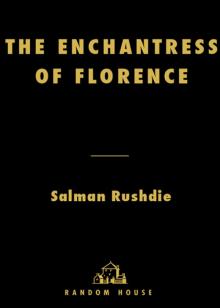 The Enchantress of Florence
The Enchantress of Florence Imaginary Homelands: Essays and Criticism 1981-1991
Imaginary Homelands: Essays and Criticism 1981-1991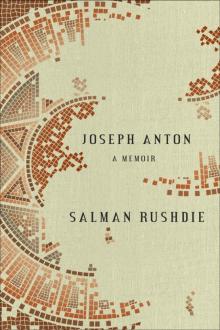 Joseph Anton: A Memoir
Joseph Anton: A Memoir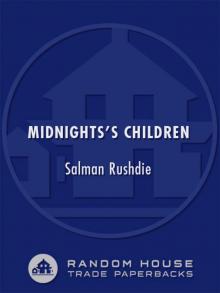 Midnight's Children
Midnight's Children East, West: Stories
East, West: Stories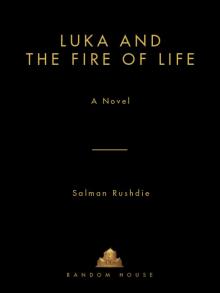 Luka and the Fire of Life
Luka and the Fire of Life Fury Fury Fury
Fury Fury Fury Haroun and the Sea of Stories
Haroun and the Sea of Stories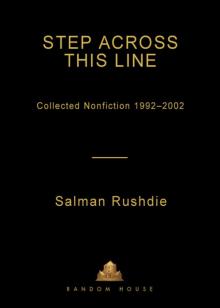 Step Across This Line: Collected Nonfiction 1992-2002
Step Across This Line: Collected Nonfiction 1992-2002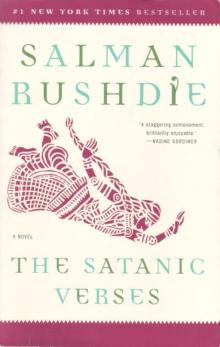 The Satanic Verses
The Satanic Verses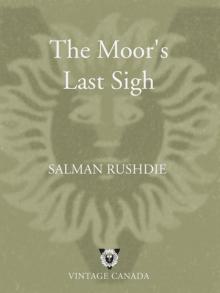 The Moor's Last Sigh
The Moor's Last Sigh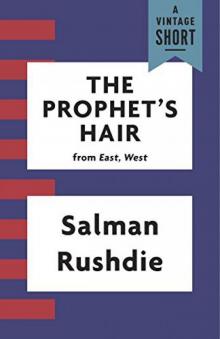 The Prophet's Hair
The Prophet's Hair The Ground Beneath Her Feet
The Ground Beneath Her Feet Two Years Eight Months and Twenty-Eight Nights
Two Years Eight Months and Twenty-Eight Nights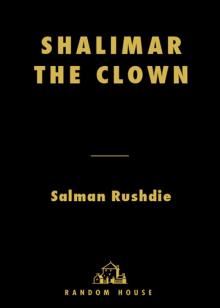 Shalimar the Clown
Shalimar the Clown Grimus
Grimus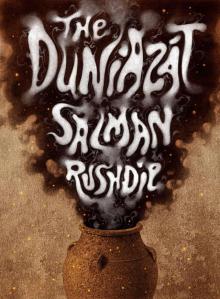 The Duniazát
The Duniazát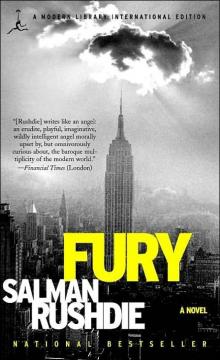 Fury
Fury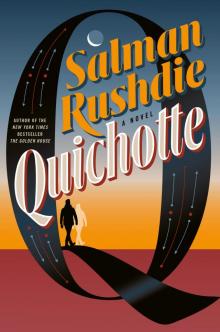 Quichotte
Quichotte The Jaguar Smile
The Jaguar Smile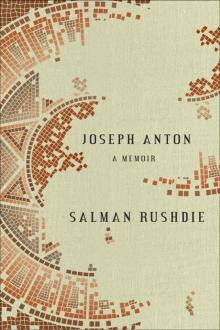 Joseph Anton
Joseph Anton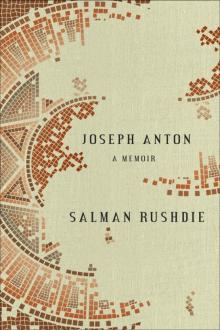 Joseph Anton: A Memoir: A Memoir
Joseph Anton: A Memoir: A Memoir Imaginary Homelands
Imaginary Homelands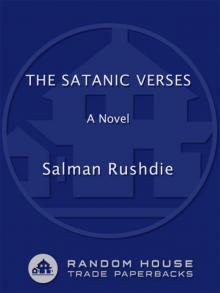 The Satanic Verses: A Novel
The Satanic Verses: A Novel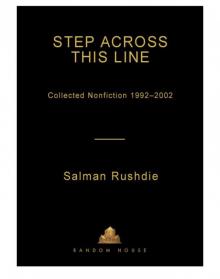 Step Across This Line
Step Across This Line East, West
East, West